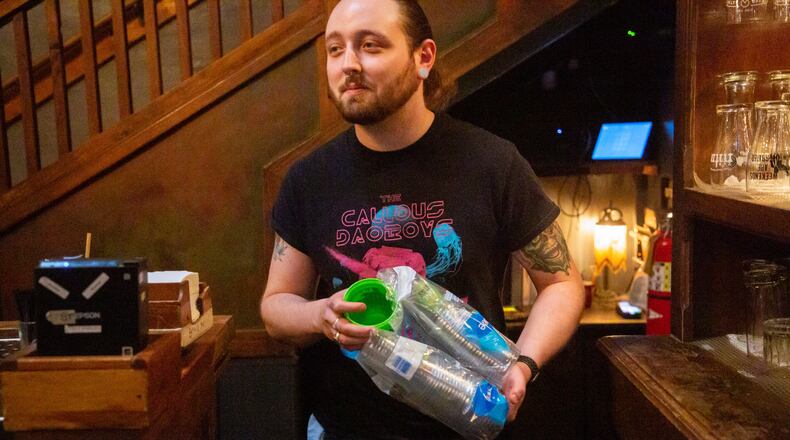The COVID-19 pandemic prompted many cities in Atlanta’s suburbs to give outdoor alcohol a shot.
While open container districts have become more prevalent over the past few years, several communities remained worried that allowing alcohol outdoors would quickly lead to debauchery in the streets. Open container proposals in the burbs have been opposed — even vetoed — over fears they would taint family-friend town centers.
However, the pandemic’s economic upheaval of the restaurant and bar industries led many cities to try out open container areas, even if just temporarily. Business owners in those communities now hope the policies become permanent, prevalent and more well-known.
“I think it was survival at first,” Mike Gallagher, who owns two businesses in Decatur Square, told The Atlanta Journal-Constitution. “Now I think it’s a couple of things. I think part of it is competition, to give your city a competitive advantage.”
Decatur was among four DeKalb County cities to create open container districts over the past year or so, but its city leaders opted to make the policy temporary. The City Commission has voted several times to extend the policy every few months, but they’ll have the option to make it indefinite at their Dec. 20 meeting.
Outdoor drinking hasn’t generated much controversy in the city, indicating that suburban residents may have warmed up to the idea of having a beer or glass of wine while window shopping or lounging in their city center. Mayor Patti Garrett indicated that outdoor drinking will likely become a new fixture of downtown Decatur.
“Many people have expressed their appreciation for being able to enjoy an adult beverage outside in the designated open container districts, particularly in light of COVID concerns about being inside as compared to being outdoors,” Garrett said in a statement to the AJC. “The temporary open container ordinance appears to be very popular and of benefit to our local businesses!”
While cities such as Duluth, Dunwoody, Kennesaw and Woodstock had embraced entertainment districts years ago, Decatur was among the more-hesitant holdouts. In 2019, former Assistant City Manager Lyn Menne said it was a topic of discussion but wasn’t a “burning issue.”
In other cities, such as Marietta, the issue was more hotly debated. In 2019, Mayor Steve Tumlin vetoed an ordinance that would have made Marietta Square an entertainment district, saying it could “have the potential” to threaten the area’s atmosphere.
The onset of the coronavirus pandemic pushed many of those worries aside. Marietta began a one-year trail period where to-go alcohol was allowed in its downtown square, and Decatur adopted its temporary ordinance in October 2020.
Gallagher, a co-owner of The Brick Store pub and Leon’s Full Service in Decatur, said sales had dropped to less than 10% of normal, so any additional revenue stream was crucial.
“Anything that could give us an opportunity or an edge to allow people to feel safe, to feel comfortable or maybe even, dare I say, excited to come out and spend some money, it was an enormous deal for us,” he said.
Sean Crotty, owner of Kelly’s Market, said it helped encourage visitors to swing in to his store, grab a beer to-go and stroll to other shops and meeting spots.
“The thing that I really like about it is the connectivity that adds to Decatur,” he said. “We’re off the square, but it lets people just kind of wander into the center of town and grab a beer on their way.”
Decatur’s ordinance requires businesses to sell alcohol in specific plastic cups that bear a city logo. Open container hours are also limited to Friday night from 4 p.m. to 1 a.m. and Saturday night from 3 p.m. to 1 a.m.
Credit: Steve Schaefer
Credit: Steve Schaefer
When city leaders weigh whether to make it permanent, they’ll consider whether to make the hours more uniform and expand the policy to Thursdays and Sundays.
Avondale Estates also established its first open container area late this summer. The city, which has won national awards for its brewery scene, saw to-go alcohol become a big hit.
In October, five breweries and brewpubs relaunched the “Dale Ale Trail,” a craft beer promotion that offered special deals. Since the participating businesses all fall within the city’s entertainment district and are within a mile of each other, the programs instantly had synergy.
“Having the open container district was very beneficial with the timing of it, because that enabled people to walk from one location to the next on the trail,” Stacia Familo-Hopek, owner and co-founder of The Lost Druid brewery, said.
She added that open container districts cater to the increased demand for walkable entertainment, and she expects sales to increase even more during the summer months when the weather is better.
“I think there’s just this continuing evolution of people not wanting to drive everywhere,” Familio-Hopek said. “They want to go out for a walk either with their children or their dogs and have some stops along the way and be able to enjoy a nice adult beverage as they’re walking without the concern of getting into a car.”
About the Author
Keep Reading
The Latest
Featured




